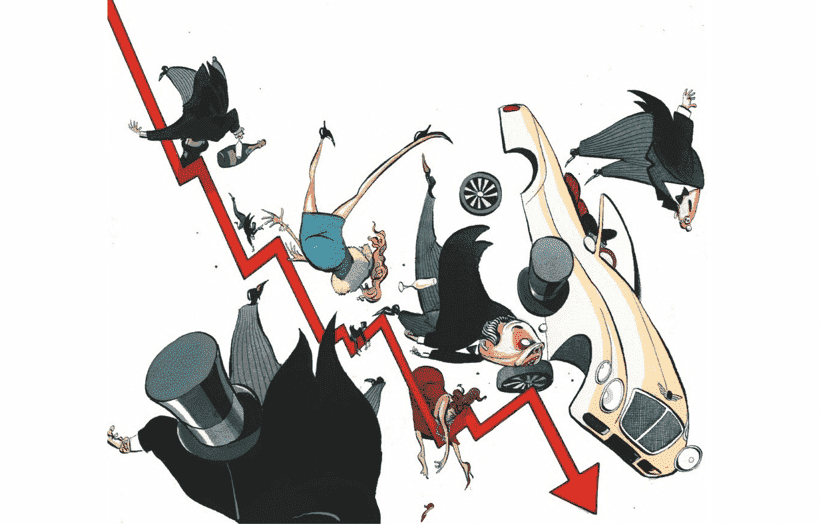The knives are out for the Prime Minister. The world watches as Britain falls into a simultaneous political and economic crisis. Yet commentators in Britain appear to think that this is resolvable. They think that bad politics gave us a bad Budget which has led to economic destabilisation. Clean out the bad politicians, reverse the bad Budget and all will be well.
None of that is true. The reality is that the Budget, however bad, is not the underlying cause of the economic crisis. The Budget merely triggered a crisis which has much deeper roots. It is comparable to a shock that sends a person with chronic heart disease into cardiac arrest. Sacking a few ministers, even a prime minister, will not restore the patient to health.
What is the underlying problem with the British economy? Simply put: due to incredibly high energy costs, Britain can no longer afford to maintain its trade deficit. For years Britain has bought more goods from the rest of the world than it has sold. Doing so is what ensures that Britain has comparable living standards to the United States.
To do so, Britain needed to attract capital from all over the world. This capital flows to Britain, financing the gap between imports and exports. Britain attracts this capital because of the extremely successful financial centre that has grown up in the City of London since Thatcher’s Big Bang reforms of 1986. The deal Britain has with the rest of the world is effectively this: you send us goods, we give you sterling, you then reinvest this sterling through the City of London to earn financial gains.
This dynamic has given rise to a lopsidedness in Britain’s economy. London and south England are enormously prosperous, with many people working in finance or adjacent services. Meanwhile, the rest of the country has seen its economy gutted; the factories and mines are no more. But the system works because the City of London and its prosperous environs ensure that sterling remains strong so that people outside of London can maintain an acceptable standard of living.
The energy crisis brought on by the sanctions and countersanctions on Russia in the wake of the invasion of Ukraine threaten to put an end to all of this. In early September – long before the disastrous mini-Budget – Deutsche Bank warned that high energy prices would blow out the British trade account. The bank forecasted a current account deficit of 10 per cent of GDP – around three times larger than is typically supported by capital inflows – and concluded that Britain would likely face a serious financing crisis, with sterling falling 30 per cent. With around a third of all goods bought in Britain being imports, this would mean an immediate fall in living standards of 10 to 20 per cent.
The sell-off in the gilt markets that we saw after the announcement of the mini-Budget was most likely the beginning of this crisis. If foreign buyers believe that sterling will fall, they sell their gilt holdings. The Bank of England (BoE) can step into the breach and effectively print sterling to buy back these bonds, as they are doing, but if the sterling flows to foreign buyers they will likely dump this too – and so sterling starts its steady decline, just as Deutsche Bank predicted.
This is precisely what we saw. In the wake of the mini-Budget, sterling cratered. Yet it now seems to have found a floor. But this is probably illusory. As it becomes clear the extent of Britain’s need for foreign capital, the drama will play out all over again. Sadly, the BoE has minimal capacity to defend sterling. If the Deutche Bank forecasts prove accurate, the BoE will only have enough foreign currency reserves to finance the current account deficits for a few weeks.
Does the British government have any capacity to control this situation? Directly, no. The government, no matter how well-run, cannot magic foreign capital flows into existence. Nor can it gift the BoE sufficient foreign currency reserves to finance the current account deficit. Indirectly, it may have some minor leverage.
Ultimately, the energy situation in Europe is in the hands of the Germans. The Russians have indicated that, despite the sabotage a few weeks ago, the Nord Stream 2 pipeline is still partly operational. If the Germans can reach an agreement with the Russians, then piped gas may start to flow to Europe once more. This would drive down energy costs and while it may not solve Britain’s economic crisis, it would certainly ease it. The British government could signal to Germany that they would favour such an outcome, though there is currently no political appetite to do so.
So expect the crisis to go on. The chancellorship is a poisoned chalice. No matter how skilled and convincing Jeremy Hunt may be, no matter how clever the Treasury staff, they face an insurmountable problem: attracting vast quantities of foreign capital that is reluctant to come and may even not exist. They should start working immediately on a charm offensive targeted at foreign capital and an open-door policy to City leaders – but that will also probably only ease the pain.
The truth is that Britain, with an economy overly dependent on financial inflows and its energy grid built to please the green lobby, was the country most vulnerable to the heavy economic damage that started when Russian troops poured into Ukraine in February 2022.
Got something to add? Join the discussion and comment below.
Get 10 issues for just $10
Subscribe to The Spectator Australia today for the next 10 magazine issues, plus full online access, for just $10.



















Comments
Don't miss out
Join the conversation with other Spectator Australia readers. Subscribe to leave a comment.
SUBSCRIBEAlready a subscriber? Log in